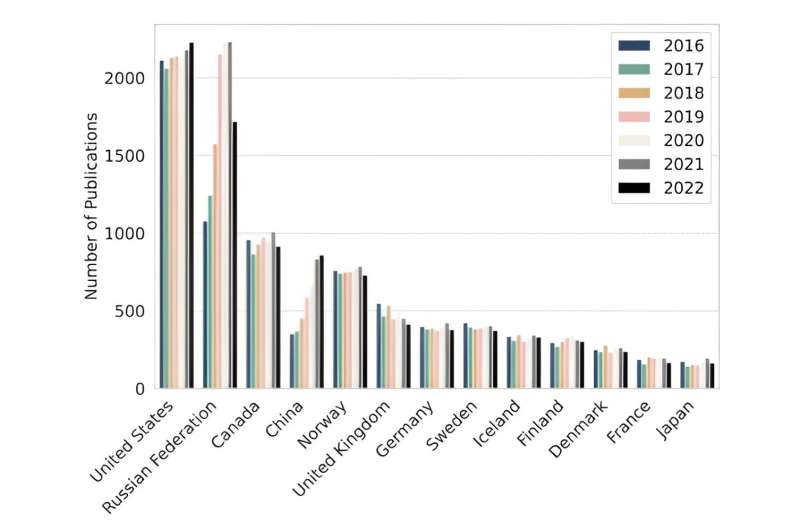This article has been reviewed according to Science X's editorial process and policies. Editors have highlighted the following attributes while ensuring the content's credibility:
fact-checked
trusted source
proofread
Arctic research grows and strengthens international cooperation: Report

A new report by UArctic highlights the growing diversity and number of research activities across the Arctic. UArctic is a collaboration between academic institutions and other organizations with an interest in northern regions. The report demonstrates a high degree of international cooperation and presents Arctic research trends.
The report shows that since the previous analysis, published in 2016, Arctic research has grown by approximately 22%. The study shows a strong continuous interest in the region across research disciplines. Indeed, interest has never faded, and with current geopolitical developments and the global ambition for a green transition of our socio-economic system, the role the Arctic in this transition is perhaps more relevant than ever.
"The field of Arctic research, from a bibliometric perspective, has not been as thoroughly explored as is motivated by the large interest in the field," says Dieter Müller, Deputy Vice -Chancellor of Research, Umeå university.
"This report is an important contribution to Arctic research globally as well as a testimony to the strengthen collaboration between Umeå university and UArctic."
Collaboration is a hallmark of Arctic research, as evidenced by the substantial international co-authorship rate, that is research papers with authors from more than one country. In 2022, just over 36% of Arctic publications involved collaborators from different countries, compared to the average of 22% across all geographic contexts.
Past research into Arctic research bibliometric was dominated by natural sciences, such as geophysics, oceanography, geology, cryosphere studies, ecology, and biology. This was partially due to previous methodological approaches and biases to studying the Arctic research. The current effort advances our understanding of Arctic research by taking a broader perspective considering the humanities, medical, and social sciences as important Arctic research disciplines.
"It is encouraging to observe the growth of Arctic Science within the fields of Social Sciences and Health over the long trend from 2005 even if the proportion of global science in each field seem to have stabilized," says Lars Kullerud, president of UArctic.
"It is extra concerning that the field of Engineering and technology remains dramatic low for the Arctic, where climate change calls for new technologies and solutions."
Interest in the Arctic, regardless of geography, politics, or research, has grown across all disciplines and is a highly relevant realm for understanding issues ranging from climate change, natural resource extraction, green energy, indigenous rights and livelihoods, to health and well-being. This is reflected in that Arctic research publications have garnered higher citation counts than the average for reference publications, indicating a notably strong scientific impact.
The findings presented are expected to drive further discussions and inspire new avenues for future analysis, funding opportunities, and new research directions. Experts emphasize the value of ongoing data utilization to deepen our comprehension of Arctic research, recognizing the importance of documenting these insights at a critical time when the teleconnections between the Arctic environment and the rest of the world have never been more important.
The University of the Arctic (UArctic) is a network of universities, colleges, research institutes, and other organizations concerned with education and research in and about the North. UArctic builds and strengthens collective resources and infrastructures that enable member institutions to better serve their constituents and their regions.
More information: Arctic Research Trends: umu.diva-portal.org/smash/get/ … 87024/FULLTEXT01.pdf
Provided by Swedish Research Council




















